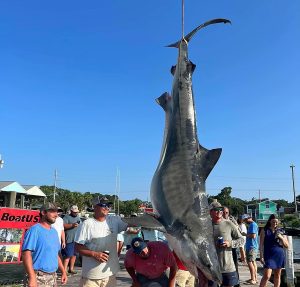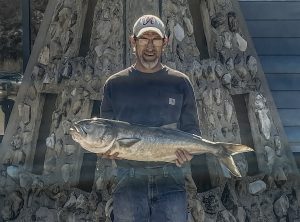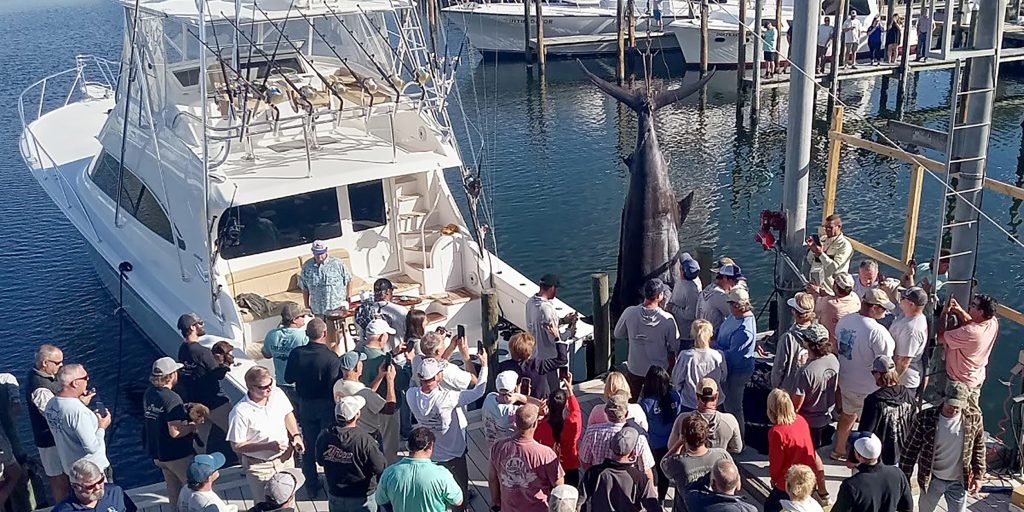As we look ahead to the 2024 saltwater fishing peak season, we can look back on 2023 and see that it was another record-breaking year for anglers in Alabama’s coastal waters and the Gulf of Mexico.
The catch that made headlines around the world was a massive blue marlin caught by Best Traits, a 55-foot Viking sport fishing boat owned by Scott Crump of Jasper. Its official weight of 1,145.6 pounds is not only the Alabama record, but also the Gulf of Mexico record. Measuring 145 inches long, Best Traits easily beat the Alabama record of 851.9 pounds caught by Ginger Myers in 2020. The Gulf of Mexico record was 1,054 pounds, set by Barry Carr in Mississippi in 2002.
Scott “Scooter” Anderson spent two hours reeling in the massive marlin, but said it wasn't easy, as he let two fish get away before the bigger one bit.
Captain Chris Mowad headed out to Chevron's deepest rig, the Blind Face Rig, which is 6,500 feet deep and about 160 miles southeast of New Orleans. The fishing team sunk a blue marlin for bait, and Captain Mowad observed a large blue marlin hit it on sonar. The marlin surfaced and began jumping. Anderson said the marlin completely emerged from the water twice.
After an hour of struggling, the marlin was dead and began to sink. With Anderson's hard reeling and Mowatt's help steering the boat, the marlin was alongside the boat. The fish was so big that they had to call a nearby boat to help load the marlin. It took seven anglers to haul the giant blue into the boat.
Scott Bannon, director of the Alabama Department of Conservation and Natural Resources (ADCNR) Marine Resources Division (MRD), said the 1,000-pound marlin known as a grander is apparently extremely rare.
“This fish was about 300 pounds larger than the previous record,” Bannon said. “We've never seen a fish that big in the Gulf of Mexico.”
“A lot of that is down to the big boats and the tournaments we hold in Orange Beach. We've become very well known for our offshore fishing tournaments, which I think raises awareness of fishing in Alabama and of course brings revenue to Alabama as anglers spend money in the local economy. We're proud to be known as a world-class fishing destination.”
Another record-breaker that created quite a stir was the giant tiger shark caught by Brett Rutledge at the 2023 Alabama Deep Sea Fishing Rodeo. The tiger shark weighed 1,019 pounds, beating the 988-pound, 8-ounce fish caught by Larry Eberly, which had held the Alabama record since 1990.

Rutledge's record fish was no accident. He went fishing with his daughter and a friend the day before the rodeo started, catching skipjack and bonito to use as bait, as well as about 400 pounds of menhaden and other bait fish for bait. When they look for fishing spots, the key is whether there's an abundance of bait around oil rigs, artificial reefs or natural bottom.
“I also got up early every morning for two weeks and made shark leaders,” Rutledge said. “I made different leaders for different uses, depending on the bait I was using. For shark fishing, I use 22/0 circle hooks and 700-pound stainless leaders.”
“You want to use equipment big enough to handle the fish with your hands. I got that fish to the boat in 30 minutes. It took a total of 36 minutes to rope the shark to the boat. It took another hour and a half to get it on the boat.”
Rutledge said he realized it was a big shark about 15 minutes into the fight when fellow angler Derrick Rogers spotted the fish and said it was “really long and girthy.” His other fishing buddies were David Rogers, Connor Blake and Joey Spiers.
“I didn't think the fish was 1,000 pounds, so I was happy when they called that number,” he said. “Derrick and Connor are really good shark fishermen. I did the easy part – reeling the line and getting the fish in. The hard part was them tying the fish on the line and pulling it into the boat.”
Bannon said the rodeo's shark section will give marine scientists access to species that are rarely available for study.
“The public loves to see big sharks, so this was a big event,” Bannon said. “On the science side, having these species brought ashore gives Dauphin Island Marine Laboratory and the University of South Alabama a lot of scientific data on these species that are rarely seen, so there's an advantage to having a limited variety of sharks brought ashore for scientific purposes.”
Another notable catch was a huge bluefish caught by Rustin Musgrove while fishing in Perdido Pass, weighing 17 pounds, 8 ounces, breaking the previous record of 17 pounds, 4 ounces set 20 years ago.

“That was a huge bluefish, but it only beat the previous record by 4 ounces,” Bannon said.
Some of the deep-sea fish species recorded last year had never been submitted for record keeping before, and Bannon said more people are venturing deep into the Gulf of Mexico to fish these days.
“People are becoming more accustomed to the electronics, reliability and fuel economy of modern boats, and so are their efforts,” Bannon said. “They have access to information on how to fish. Social media is a big part of that. They know how to set up for certain types of fishing, where to target them, and sonar helps them find the undersea features they're looking for in deep water.”
“And there are tasty food fish in the deep waters. With low catch limits for other fish species, people are targeting the deep waters. So people are diversifying and expanding their fishing techniques and fishing spots. They're catching grouper, tilefish, deep sea bream and more.”
The queen snapper, a species of bream, was first recognized as a record fish last February when Gene Stock caught a queen weighing 5 pounds, 8.6 ounces. The record didn't stand for long, however, as the following June Crawford Grant Mann caught a queen weighing 11 pounds, 4.6 ounces, nearly double the original record.
A sand tilefish caught by Tyler L. Finley last May was on record at 2 pounds, 10.4 ounces.
Another deep-sea fish record was an escolar caught by Scott Page last September, weighing in at a whopping 102 pounds, 9 ounces, more than 30 pounds heavier than the previous record.
Trey Taylor caught a jolthead porgy last June that weighed in at 9lb 2oz, while the most recent record was a silver John Dory caught in March this year that weighed in at 5lb 6.24oz.
Another new species added to the Alabama state record is the snook, which was set by Dr. Richard Tarver Webb who caught a snook weighing 5 pounds, 2.6 ounces.
“Snook are a fish that are not often caught in Alabama,” Bannon said, “and this is probably on the edge of their range. They like clear water and warm water temperatures. Pensacola has historically been considered on the edge of their range, but that's changing.”
In other marine resource news, the public is invited to participate in cleanups of abandoned crab traps scheduled for Friday, May 3, and Saturday, May 4 in Mobile Bay. Abandoned traps will be marked on Friday and removed on Saturday. A post-event social gathering will be held at Meagher State Park in Spanish Fort on May 4, starting approximately 1 p.m.
The Abandoned Crab Trap Removal Program event is a collaborative effort between MRD and the Gulf of Mexico Alliance, with volunteer support from the Coastal Conservation Association (CCA).
“We haven't cleaned up any abandoned crab traps in years,” Bannon said, “and we're so grateful to CCA and the Gulf Alliance for supporting this event.”
“We know this is a favorite activity for local people, especially in the Mobile Bay area, and we are concerned about protecting the environment. Abandoned traps can damage boats and potentially even injure someone if they're in shallow water. Plus, they ghost fish, catching fish and crabs when unchecked, and whatever was in the trap will die. We look forward to working with the public to address this.”
Organizations or individuals interested in volunteering should contact Jason Herman at MRD at (251) 968-9734 or [email protected].
Do not miss it! Subscribe now Get the top Alabama news stories delivered to your inbox.
















